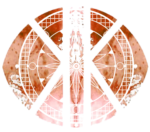Purusha
I started with “pillow paintings“while studying at ALUO in Ljubljana in 1999; later, I finished the serial, made a few more, and then stopped painting for 15 years.
Purusha is evidently a sort of Platonic world-soul who surrounds the earth from outside: “Being born he overtopped the world before, behind, and in all places” (Rig-Veda) ~Carl Jung, CW 5, Para 649
As the all-encompassing world-soul Purusha has a maternal character, for he represents the original “dawn state” of the psyche: he is the encompasser and the encompassed, mother and unborn child, an undifferentiated, unconscious state of primal being ~Carl Jung, CW 5, Para 650
There is no reason whatsoever why you should or should not call the beyond-self Christ or Buddha or Purusha or Tao or Khidr or Tifereth. ~Carl Jung, CW 18, Para 1672
These various formulations indicate the same being that we find in the Gnosis as the ethereal man, light and diaphanous, identical with gold, diamond, carbuncle, the Grail, and, in Indian philosophy, with the Purusha or personified as Christ or Buddha. ~Carl Jung, ETH, Page 118.
Plato’s idea is identical with the eastern idea of the Atman or Purusha. ~Carl Jung, ETH Lecture XI, 3Feb1939, Page 70.
You proceed beyond the ego to ever-widening horizon~, where the atman gradually reveals its universal aspect. You integrate your animal, your parents, all the people you love ( they all live in you and you are no more separated from them). This is the secret of John XVII: 20 sq. and at the same time the essential Hindu doctrine of the atman-purusha. ~Carl Jung, Letters Vol. I, Page 146
Without feet, without hands, he moves, he grasps; eyeless he sees, earless he hears; he knows all that is to be known, yet there is no knower of him. Men call him the Primordial Person, the Cosmic Man. Smaller than small, greater than great.… ~Carl Jung, CW 5, Para 182
As the all-encompassing world-soul Purusha has a maternal character, for he represents the original “dawn state” of the psyche: he is the encompasser and the encompassed, mother and unborn child, an undifferentiated, unconscious state of primal being. As such a condition must be terminated, and as it is at the same time an object of regressive longing, it must be sacrificed in order that discriminated entities—i.e., conscious contents—may come into being:
That Self, smaller than small, greater than great, is hidden in the heart of this creature here. Man becomes free from desire and free from sorrow when by the grace of the Creator he beholds the glory of the Self. Sitting still he walks afar; lying down he goes every where.
Who but I can know the God who rejoices and rejoices not? Unmoving, the One is swifter than the mind. Speeding ahead, it outruns the gods of the senses. Past others running, it goes standing. Just as a falcon or an eagle, after flying to and fro in space, wearies, and folds its wings, and drops down to its eyrie, so this Person (purusha) hastens to that state where, asleep, he desires no desires and sees no dream.
…
It moves. It moves not.
Far, yet near.
Within all,
Outside all. ~Carl Jung, CW 5, Para Para 329
Psychologically, however, the idea of God’s ἀγνωσία, or of the ἀνεννóητος θεóς, is of the utmost importance, because it identifies the Deity with the numinosity of the unconscious. The atman / purusha philosophy of the East and, as we have seen, Meister Eckhart in the West both bear witness to this. Carl Jung, CW 9ii, Para 303
In India he is Prajapati or Purusha, who is also “the size of a thumb” and dwells in the heart of every man, like the Iliaster of Paracelsus. ~Carl Jung, CW 13, Para 167
In contradistinction to the modern prejudice that self-knowledge is nothing but a knowledge of the ego, the alchemists regarded the self as a substance incommensurable with the ego, hidden in the body, and identical with the image of God. This view fully accords with the Indian idea of purusha-atman. ~Carl Jung, CW 14, Para 711
